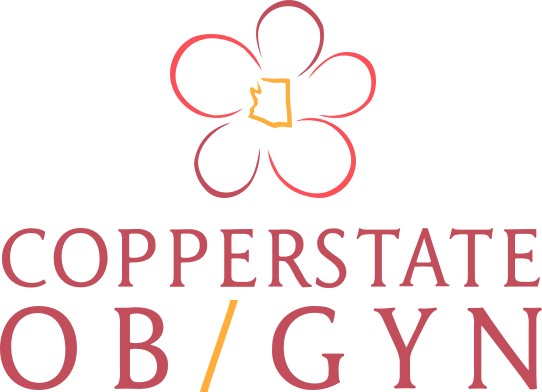The period of time after giving birth is exciting and filled with lots of love and joy – but can also be a rollercoaster ride of hormones.
After giving birth, your body will produce several different postpartum hormones including estrogen, progesterone, prolactin, oxytocin, and cortisol. The hormonal changes that occur during this time can be intense, and can lead to a variety of both physical and emotional symptoms.
The experts at Copperstate are here to help you fully understand what to expect with each of these postpartum hormones, and determine what symptoms are normal, versus when it may be time to speak with your provider.
Estrogen
Estrogen is a hormone that plays a crucial role in the development of the female reproductive system. During pregnancy, estrogen levels increase significantly, reaching their peak in the third trimester.
However, after childbirth, estrogen levels will drop rapidly, which can lead to a variety of physical and emotional symptoms. Most biological females will experience mood swings, hot flashes, and vaginal dryness during this time.
Progesterone
Progesterone is another female hormone that plays a critical role in pregnancy. It not only helps to maintain the uterine lining but also prevents the uterus from contracting prematurely. During the postpartum period, progesterone levels drop significantly just as estrogen does, which can lead to mood swings, anxiety, and feelings of depression.
This feeling is also commonly referred to as “the baby blues”. In most cases these emotions will begin to subside in 2 weeks, however, if they last longer, or you experience any of the following, it’s important to contact your provider right away:
- Difficulty bonding with your baby
- Excessive crying (from you, not the baby)
- Overwhelming fatigue
- Hopelessness
- Severe anxiety and panic attacks
- Thoughts of self-harm or harming your baby
- Thoughts of suicide
Prolactin
Prolactin is a hormone that is responsible for milk production in breastfeeding mothers. During the postpartum period, prolactin levels increase significantly, which stimulates milk production for the baby.
Unlike estrogen and progesterone, which are associated with negative symptoms postpartum, prolactin can provide a feeling of overall well-being. It typically creates a calming effect on mothers, which can help to reduce stress and anxiety.
Oxytocin
Oxytocin is often referred to as the “love hormone” because it is associated with feelings of bonding and attachment. During childbirth, oxytocin levels increase significantly, which helps to stimulate contractions and facilitate the birth process.
After childbirth, oxytocin levels remain high, which can help to promote bonding between mother and baby. Similar to prolactin, oxytocin can also help to reduce stress and anxiety in new mothers.
Cortisol
Cortisol is a hormone that is released in response to stress. During the postpartum period, cortisol levels can be elevated due to the physical and emotional stress of childbirth and caring for a newborn.
High cortisol levels can lead to anxiety, depression, and fatigue, as well as health problems over time if not lowered. Luckily, there are a number of ways you can adjust your hormones postpartum and begin lowering cortisol.
Adjusting Your Postpartum Hormones
The significant and rapid hormonal changes your body experiences after giving birth can be hard to adjust to and cause disruptions to your daily routine. Luckily, there are a number of steps you can take to ease the symptoms of postpartum hormones such as:
- Eating healthy – including sufficient amounts of iron and protein-rich foods
- Staying hydrated
- Taking postnatal vitamins
- Exercising
- Getting plenty of sleep
- Practicing meditation
- Seeking help when needed
Copperstate and Postpartum Hormones
If you are experiencing uncomfortable symptoms from postpartum hormones, Copperstate is here for you!
Our practice is recognized as one of the most progressive OB/Gyn groups in Tucson, Arizona. Our expert physicians offer a number of services focused on helping you feel your best after giving birth. Our services include annual well women exams, hormone replacement, and contraceptive counseling.
Are you looking for an OB/Gyn you can trust to support you during and after pregnancy in the Tucson area? Let us support you in achieving true health and wellness. Call (520) 721-8605 to book your appointment today.

